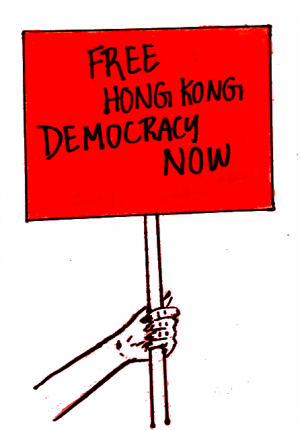Let’s chat about WeChat
The Chinese government is using the prevalent social media platform, WeChat, to censor information and control users.
November 30, 2019
Ask almost anyone in China, 2019; they’ll know WeChat is everywhere. Known in China as Weixin, WeChat was created by the Chinese tech giant Tencent. Boasting over a billion users, WeChat is a combination of a messaging app, mobile payment service and much more. However, China is utilizing the app to keep its users under surveillance and censor information opposing Chinese government ideals.
China’s harsh censorship policies have become especially relevant after the conflict between China, “South Park” and the NBA. In early October, the Houston Rockets general manager Daryl Morey tweeted, “Fight for freedom, stand with Hong Kong,” supporting the Hong Kongese protestors that China opposes. According to the New York Times, Morey soon deleted the tweet, but the NBA faced extreme backlash from Chinese officials, and the subsequent fallout spurred many protest movements and satirical parodies.
One parody, the “South Park” episode “Band in China,” poked fun at China’s far-reaching surveillance. Ironically, the airing of “Band in China” led to a national ban on all “South Park”-related content in China, causing its disappearance from search engine Baidu and other social media platforms.
With popular Western services also banned in China, such as Facebook and Google, many Chinese people depend on WeChat for their livelihood. Companies are more likely to create a WeChat account than their own website, and many citizens go completely cashless as a result of using WeChat Pay. But China has turned to the app to further censor information that disagrees with the country’s political views and societal views.
BBC China correspondent Stephen McDonell was temporarily banned from WeChat in June 2019. Covering the anniversary of the 1989 Tiananmen Square protests in Hong Kong, McDonell posted uncaptioned photos of the event to WeChat friends, receiving questions from those living in mainland China asking about the event, with McDonell giving vague responses.
Soon after, a message appeared on his screen, restricting him from logging in. “Your login has been declined due to account exceptions. Try to log in again and proceed as instructed,” it read. “This WeChat account has been suspected of spreading malicious rumors and has been temporarily blocked.”
Apparently, posting photos of an anniversary marking a pro-Democratic protest movement were grounds for getting banned from WeChat. But the scarier issue is just how quickly McDonell was locked out of his account, and the severe Orwellian steps he had to complete in order to log back in again. First, he had to wait a day before he could try to become unblocked. After that, he was required to undergo a facial scan by putting his face up to his phone’s camera. At the same time, he was required to recite several numbers in Mandarin. Only after his phone scanned his face and recorded his voice was McDonnell allowed to unlock his account.
Another incident reported by NPR concerns an American man who used WeChat as his primary means of communication to family and friends in China. Even in the U.S., Chinese officials still censored his messages. Studies show that WeChat’s use abroad “has extended the global reach of China’s surveillance and censorship methods.”
Chinese-American doctor David (whose last name shall not be disclosed for privacy) discovered that his friends and family could not read his political articles in his WeChat “Moments.” Eventually, he couldn’t send any messages at all. After his conversations were limited to non-political topics, David’s account was fully restored.
“This censorship has affected both my psychology and my behavior,” he said.
One Dougherty senior (wishing to remain anonymous) was directly affected by China’s content restrictions, even in America.
“[China’s] LGBT community frequently faces censure … Whole webpages, communities of people, were broken up and removed because they were deemed ‘morally bankrupt’ … For a bit, I lost touch with several friends,” they said.
It’s especially concerning that China’s censorship is global. If WeChat can freely control the content sent through their app in the United States, they have the power to distort users’ First Amendment rights to China’s advantage. This hurts users who are just trying to contact their family, because they risk jeopardizing their privacy and identity.
There can’t possibly be physical people scrutinizing every message sent by over one billion users. Instead, WeChat must have created an “extraordinarily advanced censorship algorithm to automatically identify combinations of keywords in messages and online articles that it then blocks.” A user’s messages are automatically censored when these keywords are found. However, this does not account for the uncaptioned, censored images that McDonnell sent.
Although it’s true that all social media companies use some form of algorithm to filter their content, none of them censor as much content as WeChat does. Citing a 2018 Amnesty International study that ranked the effectiveness of encryption systems used by 11 major technology platforms, the Australian Financial Review reported that out of 100, WeChat ranked last, with a score of 0. By comparison, Facebook Messenger scored 73. Specifically, the study stated that WeChat “did not provide end-to-end encryption — the gold standard for privacy” and could enable backdoor access to any user’s phone, including their private messages.
Unfortunately, WeChat is practically crucial if contact is desired with anyone in China. There are almost no other alternative methods of digital communication in the country, and WeChat’s many smaller offered services make it very convenient for Chinese people to use. The app’s reach is far too wide for Chinese citizens to use any other platform.
McDonnell stated that he had no choice but to continue to use WeChat.
“When you meet somebody in a work context they don’t give you a name card anymore, they share their WeChat … news stream, WeChat restaurant locations, WeChat … people wouldn’t be able to speak to their friends or family without it,” McDonnell said.
I am aware that many Dougherty Valley students use WeChat fairly often. But it is extremely risky to use an app that can threaten your safety, freedom of speech and privacy. These are basic human necessities, yet China is taking advantage of their power to use it in harmful ways.
Regardless of China’s privacy issues, there isn’t much action that we can take as a country to prohibit China from censoring information. Because they are Chinese-owned services, researchers state that America’s freedom of information laws and First Amendment rights don’t apply. Additionally, outright bans on Chinese content in our country would appear hypocritical and would only add fuel to the fire.
Due to the U.S.’s lack of control over its citizens using Chinese services, it is up to the citizens to take the initiative to change their ways.
I would highly recommend that you delete WeChat, regardless of whether you share any politically charged content or anti-Chinese sentiment. One solution would be to find an alternative non-Chinese owned service with better encryption services and privacy regulations; however, very few of these are legal in China. Another possible solution could be to use a VPN to access blocked websites, as long as you research the VPN’s credibility before downloading it.
However, if you must use WeChat in order to connect with loved ones, I encourage you to exercise caution when using the app. Although it may make your life convenient if you ever travel to China, using WeChat is a risk to your safety.




